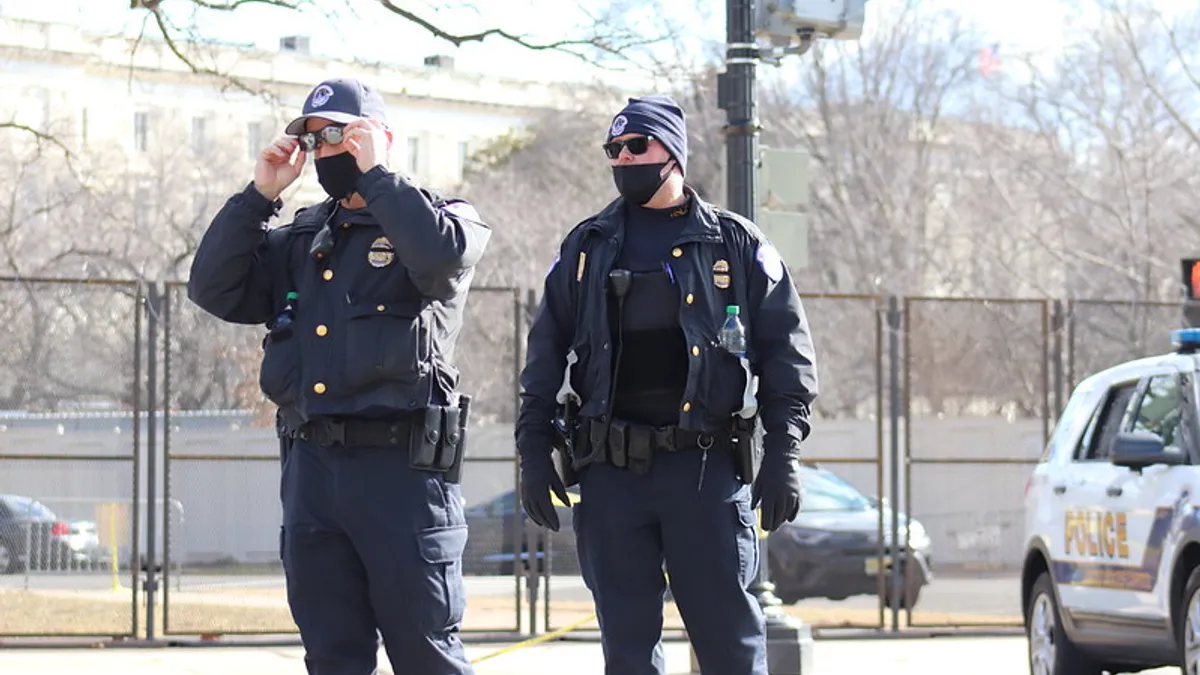The Honolulu Police Department (HPD) has added a new member to its canine unit — at least technically.
The department spent $150,045 on a four-legged Boston Dynamics robot named Spot, funded by federal coronavirus relief dollars, and is intended to help take individual temperatures at the HPD tent city for people experiencing homelessness, the Honolulu Civil Beat reports.
The purchase, along with other big-ticket items including new trucks, ATVs and a drone, has drawn criticism from local leaders and police officers.
As cities across the country continue to spend and allocate federal coronavirus relief funds, more police departments are facing scrutiny for their use of those dollars. And local leaders from Wichita, KS to Grand Rapids, MI are grappling with new questions about the effectiveness of spending coronavirus funds on various police department efforts.
The City and County of Honolulu, for instance, committed about 15% or $58 million in coronavirus relief funding to public safety, compared to about 7% and 2% committed for housing support and personal protective equipment (PPE), respectively.
In a January city council meeting, HPD Major Mike Lambert acknowledged the controversial robotic dog purchase, and said the department investments were thoughtfully assessed.
"We realize that the community is wondering," he said. "A lot of people are hurting right now, and they hear $150,000 and they're thinking it could have been used for something else."
Thanks to research done in part with MIT and Brigham and Women's Hospital, Spot can now reduce health care workers’ exposure to COVID-19 virus by measuring patients' vitals from afar.
— Boston Dynamics (@BostonDynamics) September 2, 2020
The department defended its choice to purchase the robot. And HPD Acting Lieutenant Joseph O'Neal expanded on the benefits of the robotic dog at the meeting, citing its ability to mitigate the spread of the coronavirus, prevent exposure risks to officers and social workers, and conduct rapid temperature screens in "difficult terrain with no infrastructure."
Honolulu City Council Chair Tommy Waters told Smart Cities Dive he remains concerned about the department's spending of the funds, which he said has also included about $18.5 million in overtime.
"These monies could have been better utilized in helping to support local families during these challenging times," he said. "Should additional federal funds be given to the City and County of Honolulu, it is my belief that we prioritize those programs that best benefit and serve our kūpuna, keiki, and 'ohana."
The Wichita, KS City Council also recently approved diverting $165,000 in coronavirus grant funds originally intended to hire a pandemic control officer for officer training software instead. The software is supposed to ensure "cops don’t cheat on their training," the Wichita Eagle reports.
The decision to allocate those funds was passed in a 5-1 city council vote, with Mayor Brandon Whipple opposing the move to allocate money away from a pandemic control officer, as the county climbed to 32,887 COVID-19 cases and 282 deaths at the time. The Wichita Police Department did not respond to Smart Cities Dive's request for comment in time for publication.
The Grand Rapids, MI City Commission faced a similar decision in November, turning down $500,000 in federal coronavirus relief money that would have covered police expenses and were "initially tied to the direct or indirect purchase of a ShotSpotter gunfire detection system," MLive.com reports.
The decision came as some commissioners were hesitant to sign-off on the gunshot detection technology instead of investing in existing crime prevention measures, as the city experienced a record-high rate of homicides in 2020 and allocated roughly $55.1 million to its police department in the city’s 2021 fiscal year budget.
Sandusky, OH also plans to spend its federal coronavirus relief dollars on public safety. The city received $757,000 in relief money, according to the Sandusky Register. And "safety services," including police and fire departments, account for 40% of the city’s budget.
Iowa Gov. Kim Reynolds' administration also recently dedicated $10 million in federal coronavirus funding toward state police salaries, but those officials "have played only a small role in Iowa's virus response," the Associated Press reports.
The decisions to allocate relief funds to police departments also come as local jurisdictions spent the past year responding to protestor demands to reduce police department funding, a request that went unmet in many major cities.





















